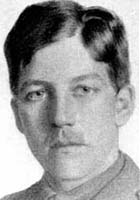Charles Hamilton Sorley
Charles Hamilton Sorley Poems
When you see millions of the mouthless dead
Across your dreams in pale battalions go,
Say not soft things as other men have said,
That you'll remember. For you need not so.
...
You are blind like us. Your hurt no man designed,
And no man claimed the conquest of your land.
But gropers both through fields of thought confined
We stumble and we do not understand.
...
We swing ungirded hips,
And lightened are our eyes,
The rain is on our lips,
We do not run for prize.
...
All the hills and vales along
Earth is bursting into song,
And the singers are the chaps
Who are going to die perhaps.
...
Such, such is Death: no triumph: no defeat:
Only an empty pail, a slate rubbed clean,
A merciful putting away of what has been.
...
From morn to midnight, all day through,
I laugh and play as others do,
I sin and chatter, just the same
As others with a different name.
...
Saints have adored the lofty soul of you.
Poets have whitened at your high renown.
We stand among the many millions who
Do hourly wait to pass your pathway down.
...
All the hills and vales along
Earth is bursting into song,
And the singers are the chaps
Who are going to die perhaps.
...
We burrowed night and day with tools of lead,
Heaped the bank up and cast it in a ring
And hurled the earth above. And Caesar said,
"Why, it is excellent. I like the thing."
...
There where the rusty iron lies,
The rooks are cawing all the day.
Perhaps no man, until he dies,
Will understand them, what they say.
...
I have not brought my Odyssey
With me here across the sea;
But you'll remember, when I say
How, when they went down Sparta way,
...
Charles Hamilton Sorley Biography
Charles Hamilton Sorley was a British poet of World War I. Life Born in Aberdeen, Scotland, he was the son of William Ritchie Sorley. He was educated, like Siegfried Sassoon, at Marlborough College (1908–13). At Marlborough College Sorley's favourite pursuit was cross-country running in the rain, a theme evident in many of his pre-war poems, including "Rain" and "The Song of the Ungirt Runners". Before taking up a scholarship to study at University College, Oxford, Sorley spent a little more than six months in Germany, three months of which were at Schwerin studying the language and local culture. Then he enrolled at the University of Jena, and studied there up to the outbreak of World War I. After Britain declared war on Germany, Sorley was detained for an afternoon in Trier, but released on the same day and told to leave the country. He returned to England and volunteered for military service, joining the Suffolk Regiment. He arrived at the Western Front in France as a lieutenant in May 1915, and quickly rose to the rank of captain at the age of twenty. Sorley was killed in action near Hulluch, where he was shot in the head by a sniper at the Battle of Loos on 13 October 1915. Robert Graves, a contemporary of Sorley's, described him in his book Goodbye to All That as "one of the three poets of importance killed during the war". (The other two were Isaac Rosenberg and Wilfred Owen.) Sorley may be seen as a forerunner of Sassoon and Owen, and his unsentimental style stands in direct contrast to that of Brooke. Sorley's last poem was recovered from his kit after his death, and includes some of his most famous lines: When you see millions of the mouthless dead Across your dreams in pale battalions go Sorley's sole work was published posthumously in January 1916 and immediately became a critical success, with six editions printed that year. Sorley is regarded by some, including the Poet Laureate John Masefield, as the greatest loss of all the poets killed during the war. On November 11, 1985, Sorley was among 16 Great War poets commemorated on a slate stone unveiled in Westminster Abbey's Poet's Corner. The inscription on the stone was written by Wilfred Owen. It reads: "My subject is War, and the pity of War. The Poetry is in the pity.")
The Best Poem Of Charles Hamilton Sorley
When You See Millions Of The Mouthless Dead
When you see millions of the mouthless dead
Across your dreams in pale battalions go,
Say not soft things as other men have said,
That you'll remember. For you need not so.
Give them not praise. For, deaf, how should they know
It is not curses heaped on each gashed head?
Nor tears. Their blind eyes see not your tears flow.
Nor honour. It is easy to be dead.
Say only this, "They are dead." Then add thereto,
"Yet many a better one has died before."
Then, scanning all the o'ercrowded mass, should you
Perceive one face that you loved heretofore,
It is a spook. None wears the face you knew.
Great death has made all his for evermore.
